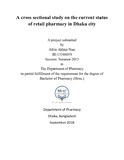| dc.contributor.advisor | Uddin, Dr. Md Jasim | |
| dc.contributor.author | Nun, Afrin Akhter | |
| dc.date.accessioned | 2019-05-05T06:06:07Z | |
| dc.date.available | 2019-05-05T06:06:07Z | |
| dc.date.copyright | 2018 | |
| dc.date.issued | 2018-09 | |
| dc.identifier.other | ID 13346059 | |
| dc.identifier.uri | http://hdl.handle.net/10361/11825 | |
| dc.description | This project report is submitted in partial fulfilment of the requirements for the degree of Bachelor of Pharmacy, 2018. | en_US |
| dc.description | Catalogued from PDF version of project report. | |
| dc.description | Includes bibliographical references (pages 37-38). | |
| dc.description.abstract | Drug manufacturing industry has significantly improved in Bangladesh with the advancement of new technologies. However irrational drug usage, insufficient access to essential drugs, wrong prescribing are major hitches affecting the overall health care scheme of Bangladesh. The National Drug Policy (NDP) 2016 has been constructed to ensure better health care by ensuring affordability, availability and rational use of medicine. However, lacks of knowledge and awareness among the dispensers and general people have suppressed the effective implementation of the NDP 2016. After doing a questionnaire survey we found that75% of dispensers of the country know that selling, dispensing and distribution of drugs should be conducted under the supervision of a registered pharmacist but only 5% of A grade pharmacist, 4% of B grade pharmacists and 15% of C grade pharmacists were found in the medicines shops to dispense drugs. Although all the participants responded positively when they were asked if they know selling expired drug is a punishable offense. When the participants were asked whether they are interested in participating training programs in future or not 71% gave positive answer where as 29% said they would not attend in any program .These conditions may lead to irrational and in appropriate use of drugs for instance over prescribing of drugs, inappropriate antibiotics selling, multidrug prescribing etc. However, the effective solutions to overcome this situation can be effective regulation and monitoring. Considering the fact that the dispensers have no other way of gaining knowledge except the formal way that is opened to them, they get into the aggressive marketing strategies easily. More opportunities should be created for the dispensers so that they can acquire knowledge in their convenient way. Initially the study was run only in Dhaka city but in near future similar kind of study can be run in the other parts of Bangladesh. Subsequently relevant projects can be designed for the development of this sectors for example educating dispensers, arranging private workshops or training programs etc. A cross sectional study on the medicine buyers might be done to understand their perspectives and to aware them about the appropriate use of medicines. | en_US |
| dc.description.statementofresponsibility | Afrin Akhter Nun | |
| dc.format.extent | 38 pages | |
| dc.language.iso | en | en_US |
| dc.publisher | Brac University | en_US |
| dc.rights | Brac University project reports are protected by copyright. They may be viewed from this source for any purpose, but reproduction or distribution in any format is prohibited without written permission. | |
| dc.subject | Drug policy | |
| dc.subject | Drug regulation | |
| dc.subject | Pharmaceutical manufacturing | |
| dc.subject | Ethical permission | |
| dc.subject.lcsh | Drugs--Law and legislation. | |
| dc.subject.lcsh | Drugs--Law and legislation--Bangladesh. | |
| dc.subject.lcsh | Pharmacy--Law and legislation. | |
| dc.title | A cross sectional study on the current status of retail pharmacy in Dhaka city | en_US |
| dc.type | Project report | en_US |
| dc.contributor.department | Department of Pharmacy, Brac University | |
| dc.description.degree | B. Pharmacy | |

